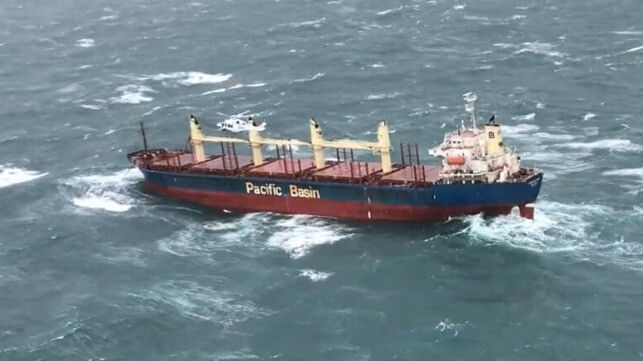Video: Australians Battle Heavy Weather to Save Powerless Bulker

Multiple Australian agencies were racing against time to save a stranded bulker that had lost power and was in danger of being driven ashore during a fierce storm off the southeast coast near Sydney. Initial attempts to rescue the crew of 21 aboard the Hong Kong-registered bulker failed due to the heavy weather and unstable conditions aboard the bulker but at last report, officials are saying the immediate danger has passed with no injuries or causalities.
An 18-year-old bulker, the Portland Bay (28,500 dwt) departed Wollongong, Australia early Monday morning after unloading a cargo of cement. The vessel is carrying approximately 1,000 tons of fuel oil and a crew of 21 heading back to Asia. The Ports of Authority of NSW, which is coordinating the multi-agency rescue, reports that “the turbofan in the Portland Bay’s main engine blew, causing the emergency.” Engineers aboard the vessel are reporting that they had spare parts aboard and felt they could make repairs at sea.
#WATCH // @Lifesaverhelo is responding to a stranded container ship off the Royal National Park. Conditions are currently too rough to attempt to winch the crew from the ship.
— Surf Life Saving NSW (@slsnsw) July 4, 2022
The ship has no power and is currently 1nm offshore. IRBS from #thirroulslsc and a jetski are on standby pic.twitter.com/O5s5TViek5
The captain issued a distress call to the Australian authorities at mid-morning reporting that the vessel was blacked out and the waters were too deep for the anchors to hold the vessel. They were being driven back to shore and he was fearing that they would be driven onto the rocks at the Royal National Park between Port Kembla and Port Botany.
The Westpac Life Saver Rescue Helicopters working with the Toll Ambulance Rescue were first on the scene with the Australian Maritime Safety Authority reporting that they had an airplane overhead to support communications with the vessel. The helicopters made several tests at lowering a winch to the bulker, but reported the vessel was pitching violently in the heavy seas and strong winds. Their efforts were being further complicated by upright structures on the vessel causing the decision to abort attempts at evacuating crewmembers with the helicopters.
#SAFETYMISSION early this morning @AMSA_News advised of a cargo/bulk carrier in distress off Wattamolla coastline. The vessel was soon located and assessment of the situation carried out. However bad weather, lots of objects and large seas made things difficult. #lifesaverhelo pic.twitter.com/IYnssAMiW0
— Westpac Life Saver Rescue Helicopters (@Lifesaverhelo) July 4, 2022
“We have eight meter swells and 30 knot winds, so conditions are really difficult for the teams,” explained Captain John Finch, Incident Controller at the Port Authority of NSW. Weather conditions were also forecast to deteriorate further into the night.
By early afternoon, the first of three tugboats had reached the stricken bulker and was able to get a tow line onto the vessel to slow its movement toward shore. The captain was also able to drop anchors to assist in holding their position. They were less than a nautical mile offshore.
“The tug crews are the unsung heroes today,” said Finch. “They have gone above and beyond the call here, battling the swells….”
The first tug to arrive reported that it lost the line on several occasions in the weather but had been able to maintain control of the bulker until two additional tugs arrived on the scene. Around 3:30 p.m. the decision was made to raise the anchors on the bulker and attempt to move her into deeper water where the crew will attempt to make repairs to the engine.
At last report, they were making approximately 1.5 knots headway and attempting to reach a position approximately 12 nm offshore. The tugs will stand by the vessel once it has been moved into a safer position. If the crew is not able to affect repairs the plan is to tow the vessel to port when the weather subsides.

that matters most
Get the latest maritime news delivered to your inbox daily.
The same storm is causing widespread flooding on the Australian coast. At least three feet of rain has fallen on Sydney prompting officials to call for more than 30,000 people to be evacuated. One man has already been reported killed by the rising waters. The forecast is calling for the rains to subside to showers and a lighter a steady rain, but the winds are expected to persist into at least Tuesday.
